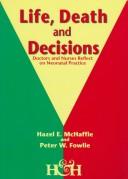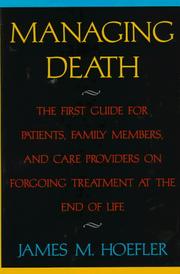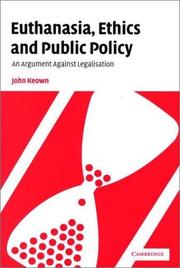| Listing 1 - 8 of 8 |
Sort by
|

ISBN: 1898507554 Year: 1996 Publisher: Cheshire Hochland & Hochland
Abstract | Keywords | Export | Availability | Bookmark
 Loading...
Loading...Choose an application
- Reference Manager
- EndNote
- RefWorks (Direct export to RefWorks)
Enormous advances have been made in the care of tiny babies. Continued existence, however, is sometimes not in their own best interests. For staff in Neonatal Units, already carrying out demanding work, decisions about which babies to treat intensively are particularly difficult and stressful to make. This book allows us to see how they decide and how they manage such cases. The facts come from a rigorous study carried out by two researchers, both heath care professionals. One of them, Dr Hazel McHaffie, spent months in six large Neonatal Units watching and listening to the doctors and nurses. We hear them describe their innermost feelings and doubts. We also see the tensions and conflicts of the real life situations where personalities and strong beliefs clash. There are no easy answers but this insight into the complexity of life and death decisions helps us to understand the questions and the dilemmas. The book reveals: the innermost feelings and doubts of staff having to make these stresful decisions; the agonies and complexities of having to make life and death decisions; and real-life situation conflict where personalities and strong beliefs clash.The purpose of the book is to help the reader understand the questions and dilemmas surrounding this very emotive subject. For staff in Neonatal Units decisions about which babies to treat intensively are difficult and stressful to make. This book allows us to see how they decide and how they manage such cases. It shows the feelings and doubts of staff having to make these decisions; and real-life situation conflict where personalities and strong beliefs clash.
Neonatal intensive care --- Moral and ethical aspects --- Decision making. --- neonatale intensieve zorg --- pasgeborene (zuigeling, neonatus, pasgeboren kind) --- stopzetting van behandeling --- levenskwaliteit --- soins néonataux intensifs --- nouveau-né --- arrêt de traitement --- qualité de vie (années de vie ajustées sur la qualité) --- Intensive care, Neonatal --- Intensive care of the newborn --- Newborn intensive care --- Decision making --- Infant health services --- Newborn infants --- Pediatric intensive care --- Neonatal emergencies --- Hospital care
Book
ISSN: 17685109 ISBN: 9782251430218 2251430210 Year: 2010 Publisher: Paris Les Belles Lettres
Abstract | Keywords | Export | Availability | Bookmark
 Loading...
Loading...Choose an application
- Reference Manager
- EndNote
- RefWorks (Direct export to RefWorks)
'Ce n'est plus une vie', 'je veux encore vivre, même avec cette maladie', 'ma vie n'a plus de valeur' : confronté à la maladie, à la déchéance physique, à la perte provisoire ou définitive de certaines capacités, chacun d'entre nous peut être conduit à énoncer de tels propos. Quoi de plus délicat, cependant, que l'évaluation de la valeur de la vie? Cet ouvrage aborde le sens et la portée de cette réflexion dans une situation où elle s'impose dans toute sa radicalité : celle des décisions de maintien ou d'interruption de la vie prises au chevet du patient dans les hôpitaux. En choisissant d'aborder ainsi la question de la valeur de la vie, ce livre fait le pari qu'une approche philosophique nourrie par une rencontre avec l'univers de la médecine contemporaine éclairera davantage le sens de cette notion, son fondement et ses limites, qu'une approche abstraite de tout contexte. La démarche cherche aussi à établir un dialogue entre philosophes et médecins en proposant une analyse des différents contextes thérapeutiques où une décision de maintien ou d'interruption de la vie doit être prise. A la lumière de cette analyse, l'ouvrage propose une réflexion critique sur les usages de l'idée de valeur de la vie pour en désavouer la pertinence et en nier la légitimité éthique. Les patients, malades mais aussi citoyens, doivent forger en concertation avec les médecins d'autres critères pour fonder une décision aussi déterminante que celle de maintenir ou d'interrompre le cours d'une vie humaine
Value of Life --- Philosophy, Medical --- Ethics, Medical --- Life --- Death --- Medical ethics --- Moral and ethical aspects --- waarde van het leven --- levenseinde (einde van het leven, levenseindebeslissing) --- levenskwaliteit --- stopzetting van behandeling --- ethiek (ethische aspecten) --- filosofie (filosofische aspecten) --- valeur de la vie --- fin de vie (décision de fin de vie) --- qualité de vie --- arrêt de traitement --- ethique (aspects ethiques) --- philosophie (aspects philosophiques) --- Biomedical ethics --- Clinical ethics --- Health care ethics --- Medical care --- Medicine --- Bioethics --- Professional ethics --- Nursing ethics --- Social medicine --- Philosophy --- Life - Moral and ethical aspects --- Death - Moral and ethical aspects

ISBN: 0813328160 0813328179 Year: 1997 Publisher: Boulder Westview
Abstract | Keywords | Export | Availability | Bookmark
 Loading...
Loading...Choose an application
- Reference Manager
- EndNote
- RefWorks (Direct export to RefWorks)
Drawing on American case studies, interviews and research, this is an examination of the medical, legal, ethical and clinical aspects of right-to-die issues. It is intended for professionals, students, and general readers facing questions about an individual's right to die.
Right to die --- Terminal care --- -#GBIB:CBMER --- levenseinde (einde van het leven, levenseindebeslissing) --- godsdienst (religie, religieuze aspecten) --- menswaardigheid (waardigheid) --- kunstmatige voeding en hydratatie --- stopzetting van behandeling --- permanent vegetatieve status (PVS) --- dementia --- End-of-life care --- Terminally ill --- Care of the sick --- Critical care medicine --- Death --- Death, Right to --- Death with dignity --- Natural death (Right to die) --- Life and death, Power over --- Advance directives (Medical care) --- Do-not-resuscitate orders --- Euthanasia --- Suicide --- Moral and ethical aspects --- fin de vie (décision de fin de vie) --- religion (aspects religieux) --- dignité humaine --- alimentation et hydratation artificielle --- arrêt de traitement --- état végétatif permanent --- démence --- Care and treatment --- Medical care --- Right to die. --- Moral and ethical aspects. --- #GBIB:CBMER
Book
ISBN: 9780199739172 019973917X Year: 2012 Publisher: New York Oxford university press
Abstract | Keywords | Export | Availability | Bookmark
 Loading...
Loading...Choose an application
- Reference Manager
- EndNote
- RefWorks (Direct export to RefWorks)
In Death, Dying, and Organ Transplantation: Reconstructing Medical Ethics at the End of Life, Miller and Truog challenge fundamental doctrines of established medical ethics. They argue that the routine practice of stopping life support technology in hospitals causes the death of patients and that donors of vital organs (hearts, lungs, liver, and both kidneys) are not really dead at the time that their organs are removed for life-saving transplantation. These practices are ethically legitimate but are not compatible with traditional rules of medical ethics that doctors must not intentionally cause the death of their patients and that vital organs can be obtained for transplantation only from dead donors. In this book Miller and Truog undertake an ethical examination that aims to honestly face the reality of medical practices at the end of life. They expose the misconception that stopping life support merely allows patients to die from their medical conditions, and they dispute the accuracy of determining death of hospitalized patients on the basis of a diagnosis of "brain death" prior to vital organ donation. After detailing the factual and conceptual errors surrounding current practices of determining death for the purpose of organ donation, the authors develop a novel ethical account of procuring vital organs. In the context of reasonable plans to withdraw life support, still-living patients are not harmed or wronged by organ donation prior to their death, provided that valid consent has been obtained for stopping treatment and for organ donation. Recognizing practical difficulties in facing the truth regarding organ donation, the authors also develop a pragmatic alternative account based on the concept of transparent legal fictions. In sum, Miller and Truog argue that in order to preserve the legitimacy of end-of-life practices, we need to reconstruct medical ethics.
Euthanasia --- Procurement of organs, tissues, etc. --- Withholding Treatment --- Ethics, Medical --- Euthanasia, Active --- Tissue and Organ Procurement --- Moral and ethical aspects --- ethics --- Procurement of organs, tissues, etc --- dood (vaststelling van overlijden, hersendood, hart- en longfalen) --- euthanasie --- orgaandonatie --- orgaantransplantatie (allocatie van organen, donorschaarste) --- stopzetting van behandeling --- Organ procurement (Surgery) --- Tissue procurement (Surgery) --- Tissue banks --- Transplantation of organs, tissues, etc. --- mort (constat de décès, mort cérébrale) --- don d'organes --- transplantation d'organes (greffe d'organes, pénurie d'organes, allocation d'organes) --- arrêt de traitement --- Euthanasia - Moral and ethical aspects --- Procurement of organs, tissues, etc. - Moral and ethical aspects --- Withholding Treatment - ethics --- Euthanasia, Active - ethics --- Tissue and Organ Procurement - ethics
Book
ISBN: 9055733059 Year: 2002 Publisher: Budel Damon
Abstract | Keywords | Export | Availability | Bookmark
 Loading...
Loading...Choose an application
- Reference Manager
- EndNote
- RefWorks (Direct export to RefWorks)
179.7 --- #GBIB:CBMER --- 603.1 --- abstineren --- ernstig gehandicapte pasgeboren kinderen --- euthanasie --- medische ethiek --- psychogeriatrie --- Euthanasie --- Versterven (niet-reanimeren, euthanasie (passieve), do not resuscitate) --- 603.2 --- ethiek (moraal) --- palliatieve zorgen --- stervensbegeleiding --- terminale zorgen --- stopzetting van behandeling --- levensverlenging (levensverlengende behandeling) --- katholicisme --- moraal en ethiek --- 179.7 Eerbied voor het menselijk leven. Moord. Zelfmoord. Euthanasie. Foltering --- Eerbied voor het menselijk leven. Moord. Zelfmoord. Euthanasie. Foltering --- Medische ethiek --- (zie ook: terminale zorgen) --- (zie ook: dood, euthanasie, palliatieve zorgen, rouw, terminale zorgen) --- (zie ook: euthanasie) --- arrêt de traitement --- prolongement de la vie (prolongation de la vie) --- catholicisme --- morale et éthique --- Professional ethics. Deontology
Book
ISBN: 1841137006 9781841137001 Year: 2008 Publisher: Oxford Hart
Abstract | Keywords | Export | Availability | Bookmark
 Loading...
Loading...Choose an application
- Reference Manager
- EndNote
- RefWorks (Direct export to RefWorks)
Euthanasia --- Law and legislation --- hulp bij zelfdoding --- terminale sedatie (pijnbestrijding met mogelijk levensverkortend effect) --- stopzetting van behandeling --- medische praktijk --- assistance au suicide (aide au suicide) --- sédation terminale (lutte contre la douleur ayant pour effet d'abréger la vie) --- arrêt de traitement --- pratique médicale --- droit comparé --- België --- Europa --- euthanasie --- Nederland --- rechtsvergelijking --- recht (wetgeving, rechtspraak, rechtsbeginselen, juridische aspecten, aansprakelijkheid) --- 241.63*4 --- 061 Ethische problemen --- Assisted death (Euthanasia) --- Assisted dying (Euthanasia) --- Death, Assisted (Euthanasia) --- Death, Mercy --- Dying, Assisted (Euthanasia) --- Killing, Mercy --- Mercy death --- Mercy killing --- Homicide --- Medical ethics --- Assisted suicide --- Right to die --- 241.63*4 Theologische ethiek: euthanasie --- Theologische ethiek: euthanasie --- Belgique --- Europe --- Pays-Bas --- droit (aspects juridiques, législation, jurisprudence, principes de droit, responsabilité) --- Medical law --- Professional ethics. Deontology --- Euthanasie --- Droit --- Euthanasia - Law and legislation - Europe
Book
ISBN: 9031324558 9789031324552 Year: 1997 Publisher: Houten Bohn Stafleu
Abstract | Keywords | Export | Availability | Bookmark
 Loading...
Loading...Choose an application
- Reference Manager
- EndNote
- RefWorks (Direct export to RefWorks)
Physiology: reproduction & development. Ages of life --- palliatieve zorgen --- medische macht --- Professional ethics. Deontology --- wilsonbekwaamheid --- Sociology of health --- Deontologie --- Dood --- Déontologie --- Ethique philosophique --- Geneeskunde --- Mort --- Médecine --- Wijsgerige ethiek --- #GBIB:CBMER --- 603.1 --- aangeboren afwijkingen --- coma --- dementie --- ethiek --- euthanasie --- geneeskunde --- gezondheidszorg --- hersenletsel --- levenskwaliteit --- medische behandelingen --- medische ethiek --- neonatologie --- pijn --- psychiatrische patiënt --- recht --- vegetatieve toestand --- zelfdoding --- Euthanasie --- 603.2 --- Nederland --- aangeboren afwijkingen (congenitale afwijkingen, hartafwijkingen) --- dementie (dementia, dementia senilis) --- patiënt --- patiëntenrecht --- stervensbegeleiding --- terminale zorgen --- zelfbeschikking --- Medische ethiek --- (zie ook: orthopedie, seksuele ontwikkelingsstoornissen, vaatziekten) --- (zie ook: terminale zorgen) --- (zie ook: dood, euthanasie, palliatieve zorgen, rouw, terminale zorgen) --- (zie ook: euthanasie) --- wilsbekwaamheid (wilsbekwame patiënten) --- dementie (Alzheimer, ouderdomsdementie) --- coma (onomkeerbare coma, comateuze patiënt) --- euthanasie (hulp bij zelfdoding) --- terminale sedatie (pijnbestrijding met mogelijk levensverkortend effect) --- zelfdoding (zelfmoord, suïcide) --- levenseindezorg --- levenseinde (einde van het leven, levenseindebeslissing) --- stopzetting van behandeling --- levensverlenging (levensverlengende behandeling) --- voorafgaande wilsverklaring (voorafgaande negatieve wilsverklaring, levenstestament, euthanasieverklaring) --- pasgeborene (zuigeling, neonatus, pasgeboren kind) --- neonatale intensieve zorg --- psychiatrische patient (geesteszieke) --- vegetatieve staat (persistente vegetatieve staat) --- lijden --- Pays-Bas --- capacité --- démence --- coma (coma irréversible, patient dans le coma) --- euthanasie (suicide assistée) --- autodétermination --- sédation terminale (lutte contre la douleur ayant pour effet d'abréger la vie) --- suicide --- soins de fin de vie --- fin de vie (décision de fin de vie) --- arrêt de traitement --- prolongement de la vie (prolongation de la vie) --- testament de vie (directive anticipée) --- nouveau-né --- soins néonataux intensifs --- patient psychiatrique (malade mentale) --- état végétatif (état végétatif persistant, état neurovégétatif persistant) --- souffrance --- accompagnement de personnes proches de la mort --- wilsonbekwaamheid (wilsonbekwame patiënten) --- voorafgaande wilsverklaring (levenstestament) --- incapacité (patient incapable)

ISBN: 0521009332 0521804167 9786610433407 0511157304 0511176465 0511495331 128043340X 051132958X 0511043937 1107123623 0511019947 9780511019944 0511028644 9780511028649 9780511043932 9780521804165 9780521009331 9780511157301 9780511495335 9781280433405 Year: 2002 Publisher: Cambridge Cambridge university press
Abstract | Keywords | Export | Availability | Bookmark
 Loading...
Loading...Choose an application
- Reference Manager
- EndNote
- RefWorks (Direct export to RefWorks)
Whether the law should permit voluntary euthanasia or physician-assisted suicide is one of the most vital questions facing all modern societies. Internationally, the main obstacle to legalisation has proved to be the objection that, even if they were morally acceptable in certain 'hard cases', voluntary euthanasia and physician-assisted suicide could not be effectively controlled; society would slide down a 'slippery slope' to the killing of patients who did not make a free and informed request, or for whom palliative care would have offered an alternative. How cogent is this objection? This book provides the general reader (who need have no expertise in philosophy, law or medicine) with a lucid introduction to this central question in the debate, not least by reviewing the Dutch euthanasia experience. It will interest all in any country whether currently for or against legalisation, who wish to ensure that their opinions are better informed.
Euthanasie --- Medische ethiek --- euthanasie --- ethiek (ethische aspecten) --- hulp bij zelfdoding --- recht op waardig sterven --- menswaardigheid (waardigheid) --- stopzetting van behandeling --- Nederland --- Australië --- Verenigde Staten --- Euthanasia --- Terminal care --- Cross-Cultural Comparison --- Ethics, Clinical --- Health Policy --- Suicide, Assisted --- Medically Assisted Suicides --- Suicide, Medically Assisted --- Suicides, Medically Assisted --- Assisted Suicide --- Death, Assisted --- Medically Assisted Suicide --- Physician-Assisted Suicide --- Assisted Death --- Assisted Deaths --- Assisted Suicides --- Deaths, Assisted --- Physician Assisted Suicide --- Physician-Assisted Suicides --- Suicide, Physician-Assisted --- Suicides, Assisted --- Suicides, Physician-Assisted --- National Health Policy --- Health Policies --- Health Policies, National --- Health Policy, National --- National Health Policies --- Policies, Health --- Policies, National Health --- Policy, Health --- Policy, National Health --- Clinical Ethics --- Clinical Medicine --- Society and euthanasia --- Assisted death (Euthanasia) --- Assisted dying (Euthanasia) --- Death, Assisted (Euthanasia) --- Death, Mercy --- Dying, Assisted (Euthanasia) --- Killing, Mercy --- Mercy death --- Mercy killing --- Ethique médicale --- ethique (aspects ethiques) --- assistance au suicide (aide au suicide) --- droit de mourir dans la dignité --- dignité humaine --- arrêt de traitement --- Pays-Bas --- Australy --- Etats Unis --- Moral and ethical aspects --- Social aspects --- legislation & jurisprudence --- ethics --- Eutanasia. --- Euthanasia - Social aspects. --- Euthanasia, Active, Voluntary --- Value of Life --- Wedge Argument --- Double Effect Principle --- Advisory Committees --- Supreme Court Decisions --- Policy Making --- Euthanasia. --- Homicide --- Medical ethics --- Assisted suicide --- Right to die --- Moral and ethical aspects. --- Social aspects. --- #GBIB:CBMER --- Ethicists --- Ethics Committees, Clinical --- Ethics Consultation --- Transcultural Studies --- Comparison, Cross-Cultural --- Comparisons, Cross-Cultural --- Cross Cultural Comparison --- Cross-Cultural Comparisons --- Studies, Transcultural --- Study, Transcultural --- Transcultural Study --- Cultural Characteristics --- Culture --- Right to Die --- Euthanasia, Active --- Cross-Cultural Comparison. --- Healthcare Policy --- Healthcare Policies --- Policy, Healthcare --- Law --- General and Others --- Health Care Policies --- Care Policies, Health --- Health Care Policy --- Policies, Health Care --- Policies, Healthcare --- Policy, Health Care --- Euthanasia - Moral and ethical aspects. --- Terminal care - Moral and ethical aspects.
| Listing 1 - 8 of 8 |
Sort by
|

 Search
Search Feedback
Feedback About UniCat
About UniCat  Help
Help News
News